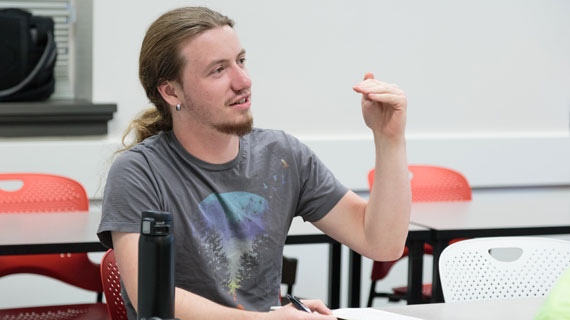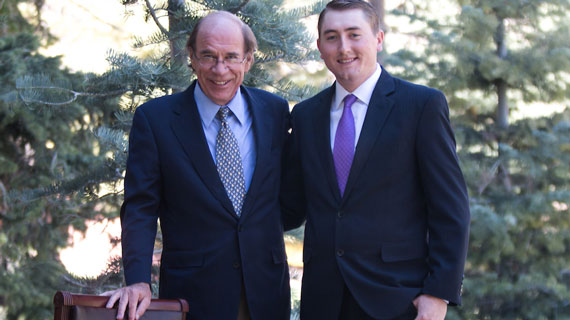Pizza and Politics Focuses on Free Speech
Posted: November 06, 2017 | Author: Cami Mathews | Read Time: 3 minutes
 The Michael O. Leavitt Center for Politics and Public Service hosts Pizza & Politics every Wednesday at noon to discuss a current political topic. Leavitt Center student employees research the topic and moderate the conversation. These discussions expose students to a variety of important issues and encourages them to share their own perspectives while learning all sides of an issue. Free pizza is provided for all who attend.
The Michael O. Leavitt Center for Politics and Public Service hosts Pizza & Politics every Wednesday at noon to discuss a current political topic. Leavitt Center student employees research the topic and moderate the conversation. These discussions expose students to a variety of important issues and encourages them to share their own perspectives while learning all sides of an issue. Free pizza is provided for all who attend.
The discussion, moderated by graduate students Jake Richins and Cami Mathews, focused on free speech from the first amendment, down to its meaning on the campus of Southern Utah University.
According to the Supreme Court of the United States, the right to freedom of speech allows individuals to express themselves without government interference or regulation. The Supreme Court requires the government to provide substantial justification for the interference with the right of free speech where it attempts to regulate the content of the speech. The Supreme Court also recognizes that the government may prohibit some speech that may cause a breach of the peace or cause violence.
What does free speech mean to you?
Overall, the audience felt that everyone is allowed to speak freely. Free speech allows for citizens to speak out against the government, voice their opinions, and agree or disagree with others.
Free speech does not include the right to: incite actions that would harm others, make or distribute obscene materials, burn draft cards as anti-war protest, permit students to print articles in a school newspaper over administration objection, for students to make an obscene speech at a school-sponsored event, and for schools to advocate illegal drug use at a school-sponsored event.
When discussing free speech, hate speech came up as a heated topic of debate. According to the American Bar Association, hate speech is speech that offends, threatens, or insults groups, based on race, color, religion, national origin, sexual orientation, disability, or other traits. The government may prohibit speech that may cause violence or breach of peace
Where should the limits, if any, to freedom of speech be set?
The general consensus of the first question did not transfer over to the second question. Those that were adamant about having the right to free speech spoke out against prohibiting hate speech. Many claimed that hate speech only came about from people getting their feelings hurt.
The side that agreed with the government prohibiting hate speech tried to show that when a person is surrounded by hateful speech, their entire life is negatively affected. If a student on campus were to be surrounded by hate speech, they could stop attending, stop talking to others, and could eventually stop wanting to live.
If there are limits to free speech, who should set them?
Those who favored free speech limitations came up with two possible solutions to the question: direct vote by the people or from Congress. The issues that arose from the latter solution were issues expressed during last year’s presidential election. Just because the people vote one way does not mean Congress will properly represent them.
How should free speech be regulated, if at all, on university campuses?
This question began to hit home for everyone in the audience. Many said that campuses should not regulate free speech as long as they are a public university. As far as private institutions go, no one had a solution.
The conversation for campus limitations on free speech led back to hate speech. How could a student go to class and excel as a student if they could not face the hatred felt on campus? This related to campus speakers, as many universities have seen negative responses by students for speakers booked.
Overall the audience was split in two, as with most of the conversation: no limits on free speech (except in the case of violence) or limits on free speech to ensure a safe environment for all.
This article was published more than 3 years ago and might contain outdated information or broken links. As a result, its accuracy cannot be guaranteed.
Tags: Blog Leavitt Center



